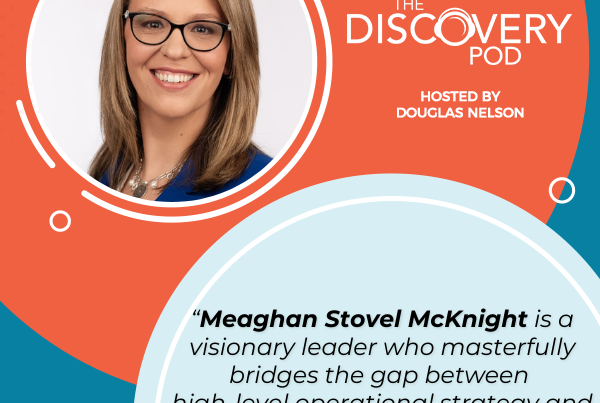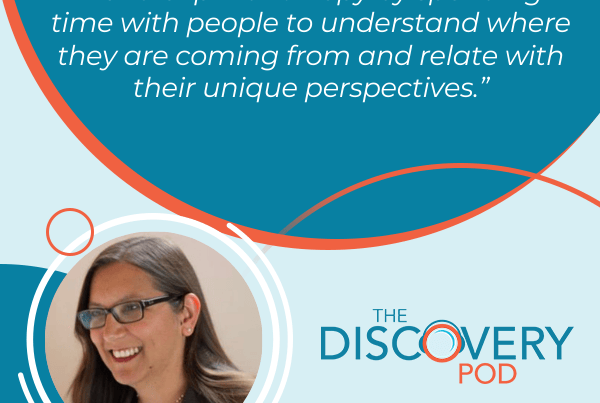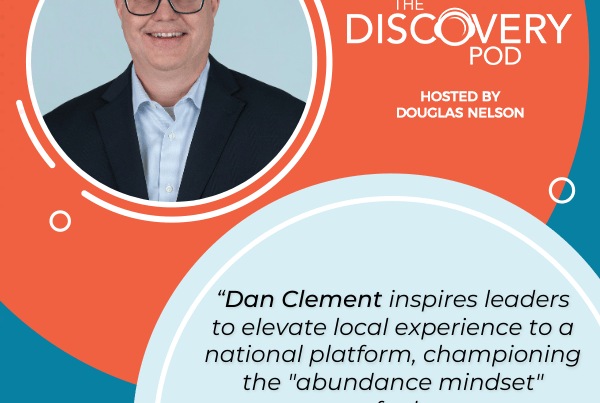As Season 8 of the Discovery Pod draws to a close, join us for a reflective wrap-up with your host Douglas Nelson and special guest Alex Wilson, Director of Communications and Producer of the Discovery Pod. In this finale, we dive into the heart of the social profit sector, exploring the top challenges leaders face today and the strategic insights from our most inspiring guests. From staff retention to the critical role of board engagement, we cover it all. Get ready for a deep dive into the lessons learned and what leaders should prioritize as they prepare for a dynamic fall. Tune in and let’s take stock of our sector’s pulse together.
—
Listen to the podcast here
Season 8 Reflections With Douglas Nelson, Host, & Alex Wilson, Producer
On this episode, I’m joined by Alex Wilson, Director of Communications and Producer of the Discovery Pod for our final episode of Season 8. As we wrap up for the summer, we take a pulse of the sector, reflect on the incredible guests we’ve spoken to, the lessons we’ve learned, and discuss what leaders should be thinking about this summer before heading into a busy fall. Welcome to the show, Alex.
Staff Retention
Doug, thanks for having me. As usual, it’s great to join you. I can’t believe Season 8 of the Discovery Pod is done. Over the past year, we have had the honor of speaking with more than 40 social profit leaders from all corners of this sector and I get to play host. Turn the table on you and ask the questions that I know our readers want the answers to. Let’s kick it off here. Last season, we heard many CEOs talk about the challenges of the labor market. This year, that theme continued but staff retention seemed to come up more often. Why do you think that is? What can CEOs do if staff retention is an issue that they’re facing?
Every CEO is facing an issue related to staff retention. Some CEOs are facing the issue of retaining themselves in the organization that they’re in and looking at what might be on the other side of the past defense. The staff retention is central. During this last season, we spoke with Brian Bowman, the Associate Vice President at the Southern Alberta Institute of Technology. He went deep on the culture that he has built over at SAIT that fosters a culture of team and belonging. They have remarkably low turnover.
Where I see retention being an issue and the most painful issue and our colleague, Christoph Clodius, who leads our search practice would agree. Organizations are seeking growth, wanting to scale what they do, expand what they do, and offer new services to those that they serve in pursuit of their purpose. The hiring and retention of the fundraising leaders is becoming increasingly challenging.
Fundraising leaders are needing a lot more to meet the higher expectations. The organizations that are keeping the fundraisers are the ones that have fundraising advancement and development at the core of the organization. Rather than being off down the hall as their own independent department. There are the most effective programs. Other ones where the fundraising leaders are an essential contributing part of the leadership team with direct access and frequent FaceTime with the CEO. That’s been a big issue.
The other, beyond that area in the organization, what we’re seeing and what we heard from our guests were some key lessons. Making sure to make the strategic plan and the purpose of your organization alive for everyone who works there. Make it clear and give everyone the opportunity to see how their work contributes directly, most often, or sometimes indirectly to the work of the organization and the value that each individual creates as a member of the team.
We’re well past the stage where Imperial leaders could hold on high what the strategic plan is and assign goals and move forward. If organizations aren’t past that, they will have to get past that because they’ll have our time holding on to staff and they won’t be able to meet their strategic plans and their plans for growth. The organizations that are most successful at this keep purpose alive. The organizations that are most successful at this are clear on what’s expected from members of the team. Most organizations that are successful have leaders, CEOs, and heads of different departments who reflect credit and accept blame for everyone on their team and show up as human beings at work every day.
Where The Sector Is At
That’s some great advice. Based on your conversations that we’ve had on the show as well as the work that we lead at the Discovery Group. What is your perception of where our sector currently is at?
The headline for where our sector is at and the flashing billboard that I put up on Highway-1 right across the country, if I could, is keep going. Our sector has been called upon in a way that it never has before and it responded remarkably well. We are seeing the effects. Not so much of the immediate burnout that followed the pandemic, but what is the new normal? What are we going back to? What are we building for going forward?
There are a lot of leaders who are tired. If you’re a leader in your organization, regardless of the position you hold, if you’re a leader. It’s okay to feel tired. In fact, most leaders in our sector are. Being tired isn’t the excuse to stop. Read the sign and keep going. The social change in the push for equity that has been so critical in our sector, important and has gained so much traction and oxygen in our sector over the last number of years continues to make progress though slower than anyone would like on a number of fronts. Again, keep going.
Being tired isn't the excuse to stop, so read the sign and keep going. Share on XWith the number of CEOs that we get to work with that are challenged with how they engage, the well-intentioned, well-experienced, and brilliant people around their board tables into the purpose of their organization. Again, those organizations that are leading with their purpose. What we’re here to do rather than taking the time to explain the difference between what a mission and a vision is and whiteboarding values as part of a weekend session.
Focusing on purpose works. It engages people. It engages yourself knowing why you’re showing every day why you’re working as hard as you’re doing. The organizations and the people that are most successful that I’ve seen over the course of the last year and will continue to be successful in the months and years ahead are those leaders, those organizations that center on purpose, show up every day and keep going.
Issues With Boards
I love that. Doug, off the mic, you spend a lot of time talking with CEOs about the challenges they face, especially challenges with their boards. What are the common issues you keep hearing from CEOs about boards? Most importantly, what is the advice that you keep giving them?
You get to be a part of these conversations once we stop recording when we’re doing episodes. The CEOs often say, “I’m glad you didn’t push me too hard on my board. I’m having some real trouble there.” You hear a lot of the issues. The issues come down to a couple of things. One, it’s finding that balance between what is the board’s role and what is management’s role.
We use the distinction of strategy as the board and operations as the organization. Except most management teams are driving the strategy of their organization. It’s a false distinction. The odious phrase that we have to root out of our sector in the interests of common sense, good governance and sanity is the phrase, nose-in and fingers out, where boards are these nameless faceless panels that evaluate and act as overseers for the organization.
It’s simply not what success looks like in our sector. We need engaged contributing active human beings around the board table who are willing to give their best advice and show up as their best selves. On the management side, we need to do an effective job of making it possible for people to show up as their effective best selves and contribute their advice whether they’re introverted or there are other reasons why they’re quiet. We need to make sure that there are ways for everyone to feel engaged.

Social Profit: We need engaged, contributing, active human beings around the board table who are willing to give their best advice and show up as their best selves.
A lot of the advice and a lot of the time that I spend working with CEOs is around creating space for talking about what’s most important in their organization. Boards members who care about your organization want to know what’s going on in your organization. They’re curious about how it works, especially those that have been successful in business themselves. They’re curious about what’s driving the organization.
What are the strategic levers that have the greatest potential to advance our cause? What are the challenges we’re facing? What are the barriers that may be self-imposed that we can find a way around or through or remove? They’re curious about it. That doesn’t mean that they want to make the decisions or they want to drive operations. It means that they want to understand how it works.
I encourage CEOs right across the country, every single one of our readers to understand that difference and reflect on that difference between boards who are curious and boards who are seeking to decide or seeking to direct. When they’re curious, if you tell them, if you have members of your leadership team presenting the challenges they’re facing in their lines of your organization, there are areas of accountability in your organization. The board is going to feel like they know the organization better and the team better.
They’re going to feel more comfortable giving their advice. In fact, they’re going to give even better advice. If they don’t know how the organization works, if they don’t know what the strategic levers are, how the fundraising revenue is invested in and how it’s received and who’s giving and who’s not. They’re going to continue to give bad advice like, “We should have a pin like the Canadian Cancer Society or we should have a second gala.” CEOs will go away from, “See? When I ask for their advice, they give me terrible advice.”
Time and time again, I say, “That is on the CEO. That is on the management team for not ensuring that the board has a clear understanding of how the business of their organization works.” What are those key strategic drivers and how the advice of these brilliant people who want to contribute can be best leveraged to advancing the purpose? It’s not easy. Not everybody shows up with the best intentions. Everybody shows up wanting to contribute.
You can have people who wear the black hat. You can have people who show up and want to say, “I’ll be the devil’s advocate.” If you’ve got one of those on your board, I would encourage you to speak to your chair and say, “That’s not a role on a social profit board. The devil’s advocate is an ecclesiastical position to advocate against someone being made a saint. That is not the work that we do in our organization. That is not a role that this board has and it’s not a self-appointed role that we can permit individuals to do.”
Devil’s advocates find fault because that’s their job. We need board members who are engaged and who are asking questions. Sometimes finding fault but with an end towards finding a solution toward finding a better way of doing, approaching a problem or resourcing an issue or a problem in your organization, or even seizing an opportunity. There is no leader of the opposition. There is no devil’s advocate. If you hear those words around your board table, you need to have a conversation in your chair about making sure those words, phrases, or roles are not continuing to occur on your board table.
It turns off all of the other board members. It allows them to sit back and become less engaged. It allows individuals who are wanting to be challenging and challenging for challenges sake. They take a lot of oxygen out of the room. It makes it more difficult for people to feel good about the work they’re doing around the board table. It’s harder for people to respond to the next issue if they’re waiting for your devil’s advocate or your leader of the opposition to take the floor back and criticize again. That is something that if I could.
We sometimes ask on the show, Alex, what’s the magic wand? I want a magic wand that has a lot of different tricks to it. If I had a dozen or so things that could change with a magic wand, one of them certainly would be eliminating that phrase: devil’s advocate and leader of the opposition. The other one is, you know what you should do. If your board is saying, “You know what you should do.” It means they don’t understand your business model.
If your board is saying you know what you should do, it means they don't understand your business model. Share on XThey don’t understand what’s driving your organization, what are the determinants of success, what success looks like, and what the logical and reasonable restrictions are on your organization. You know what you should do is lazy thinking. If you’ve got that, that’s a conversation. Again, as a CEO, you need to sit down and have that conversation with your board chair.
That’s a wonderful perspective, Doug. I wish I also had a magic wand.
Alex, what would you change if you had a magic wand?
I see a lot of organizations wanting to do meaningful work in the DEI space and coming at it with good intentions, but then not necessarily reflected all the way through across their board. We see many organizations going out and recruiting for board positions and still asking for the same credentials that were being asked upon 20 or 30 years ago.
Unfortunately, people that are coming from historically marginalized communities have not had the same level of experience and given those opportunities. I see that a lot of the organizations have made significant progress in the DEI space and have the best intentions but are still falling back on lazy practices of decades past. That’s the thing that I would change first and foremost.
If we find a magic wand, you go first.
Making Space
Many times in this sector, I’ve heard you emphasize the importance of making space for the bigger picture. What does that look like? How can CEOs carve out the space where the demands of operations are all consuming?
I think about this. I got a new phone about months ago. It had been a year. You get a phone every year. I don’t get a phone every year but I got a new phone. It reinstalled Outlook onto my phone. When you install Outlook onto your phone, all of the notifications are turned on. It brings to remind you, you’re fifteen minutes before you have to be somewhere or five minutes. It starts now. You’re five minutes late.
Every email, every text, everything started to bing and it was maddening. I’m sure, like most of our readers, I get lots of email and lots of opportunities to communicate with colleagues, friends and people who are promising to all sorts of AI-type businesses that’ll help the Discovery Group be better. It took me about a week to figure out how to turn off all the notifications and go back to a more sane way through the day.
For CEOs, much of their day-to-day work is like that new version of Outlook that had the notification silence, everything good or bad. Everything is good and different. Transactional, you have to do it. All of it can be interruptive and it takes you away from focusing on what’s most important. One way of turning the notifications off on your Outlook and to apply it to the work of the CEOs, is to hold time in your calendar. It’s so much easier said than done, but please try it.
Even one hour a week, where you’re going to hold that time to stare at the window or stare at the wall, go for a walk, and see what comes to the surface in terms of what is most important in your organization. CEOs know this so well. It is the line and the inherent tension in the work of urgent versus important. Many CEOs that we work with are dealing with the tyranny of urgency.
What we try to work with the CEOs and their leadership teams on, especially as they’re preparing for significant philanthropic campaigns is what is going to make the biggest difference? What are the three factors that are going to determine your success for your organization over the next 6 months, 9 months, year, and beyond? What are the three things? Not 5, not 10, or 12.
Alex, you’ll remember this. We started out saying, name the one thing. One of the things came very clear is no one could have one thing. It was a frustrating thing going back and forth about one wall, one and a half, and sentences became paragraphs. We made it three. What are the three things that are going to be most important for you in your leadership position for your organization? How do those things relate to you as an individual, as a professional in the role that you’re in?
One hour a week makes a huge difference, but clarity around what matters most is what makes the biggest difference here. Make the time, go for a walk, know what’s most important, and prioritize accordingly. There are so many opportunities. There are so many notifications that come in that draw our attention away. The leaders that I’ve worked with that I’ve been most inspired by are the ones that are able to either not hear the notification. They don’t hear the bing. They’re not distracted and they continue on or they hear the bing and they keep going anyway.

Social Profit: Clarity around what matters most is really what makes the biggest difference here.
Being able to know what those three most important things are for your organization and for you as a leader in your organization may not always be the same thing, but knowing those is going to make a huge difference to being able to focus on what’s most important to move the needle the most in your organization. The CEOs that I work with who are the very best, and of Kelly Cole at Sunnybrook Hospital Foundation. She is the last person in this sector to say, “I’m busy.” She works hard and gets a lot done on the things that matter most. It reflects in the growth that our organization has seen over the last couple of years.
Preparing For September
I think that answer was intended for me, Doug. I need to find a discipline to turn the notifications off but that’s a quality of how business works these days. I love that answer. As we head into the summer, boards are taking a break, and many staff are taking vacation. How should CEOs take advantage of this time? What steps should they take now to prepare for a successful September?
There’s a couple ways to answer this. The first one is what can you do to improve the working of your board and the functioning of your board over the course of the summer or anytime, but we’ll talk about summer because it fits into the narrative of our show here. The idea is to be curious. Get curious about what motivates your board members to be on the board. Get curious about what they want to know about the organization.
What are outstanding questions they have? Not about how the board works necessarily, but about how you deliver service or how you’re raising money or how you decide on particular strategies. Some board members are curious about how a particular event works. That doesn’t mean they want to pick the color of napkins. It means they want to understand how that event contributes to the purpose of the organization.
I often see the summer as an opportunity for CEOs to connect one-on-one with board members. Have a phone call. Pick up the phone call. You can schedule it if you have to depending on how busy they are and how busy you are in the summer. Rather than going away and hibernating for two months, most CEOs don’t have that luxury.
Rather than hibernating from your board, I encourage you to have one-on-one conversations. The phone often works better than video calls or in person. It seems a little less formal and people tend to have their guard down and board members can be a bit more vulnerable. Be curious about what matters to them, what they want to know, and think about how you can deliver that over the course of the meetings that are starting in the fall.
If you’re dealing with your board, that’s what all CEOs can do, connect one-on-one, be curious about what they want to know and what matters most to them. Now, what CEOs can do around their organization and being CEOs, two things, read and read. Read a good book. Read a bad book. Read two bad books. Whether it’s fiction or nonfiction, exploring how the world works through the eyes of others gives us perspectives in the leadership journey. That’s simple. That’s my LinkedIn quick one there.

Social Profit: Exploring how the world works through the eyes of others gives us perspectives in the leadership journey.
The second piece that is important is to take some time to think about the difference between what the success of the organization means and what success for you as CEO means or you as head of fundraising or head of marketing or whatever your role is in your organization. Particularly the CEO, CEOs are accountable for everything.
Everything that happens in the organization, they get to put on their resume. That includes the things that don’t go very well. It’s not about shedding accountability or not being responsible for things. As an individual, where can you as a leader in your organization have the most value? It’s probably not returning emails. It’s probably not attending a lot of meetings. It’s probably something that is thoughtful, strategic, and meaningful.
It could be as simple as spending the summer and talking to a lot of donors. Thanking a lot of donors. That would help but understand the difference between what makes you successful as a leader and what makes your organization successful. Now, they’re going to be close. Ideally, they’ll be closely aligned. If they’re not, give me a call. We could talk that through.
They’re going to be closely aligned, but they are different. Understanding how you add the most value to your organization is one of the greatest breaks against burnout I’ve seen in our sector. Knowing the value that we bring as individuals and where we’re at our best when we’re in our zones of greatness allows us to spend more time in those zones of greatness and less time in those zones of frustration, which lead to burnout.
Season 8 Surprises
That’s great advice. Doug, what surprised you the most from the season?
A couple of the things jumped out at me when we were talking about the session and going through the list of the guests. I was like, “No wonder Alex is so busy. This is such an amazing group that we had and such a variety of styles of leadership. There is no right way to lead an organization in our social profit or sector. There are several wrong ways but the right way has to be one that works for different leaders. One of the big transitions in healthcare philanthropy in the country with new CEOs is at SickKids and at UHN.
There is no right way to lead an organization in our social profit or sector. Share on XWe had both Jennifer Bernard from SickKids and Julie Quenneville from UHN on the show, and sharing very different approaches that were tailored to the organizations they’re leading for what it means to be a new leader, following legacy leaders who had set high bars for performance that they were succeeding. Very different approaches. Both very authentic to who they are as people and as leaders. I got on both of those episodes when we were recording, feeling encouraged and excited about what was ahead for those organizations.
We also had Teresa Virani on. She was remarkable from the Nicola Wealth Foundation, and understanding her perspective on the role that Nicola Wealth can play in building capacity in the organization, in the sector, and for organizations as an ally, sitting on the same side of the table as the organizations they fund, as well as the donors that are investing through their donor advised funds at Nicola Wealth. It’s an interesting perspective on that.
Finally, I’ll say, I don’t know that I was surprised. In our work, Alex, in the course of 2024, while we’ve had 40 guests, we’ve worked with more than 80 organizations over the course of 2024 here at the Discovery Group. I am so amazed at the quality of resilience and creativity that comes through in our sector.
One of the things that I’m hoping we can transition to is a way from resilience which is resistant and puts us in that scarcity mindset to honoring the creative which is that focus on abundance. There are so many of the guests that we had on this show that we’re just right centered on abundance and telling a story about a future that is better for all of the individuals that their organization serves. It’s so inspiring and encouraging to see what our sector has done over the last year and what it will continue to do over the years to come.
You mentioned many of the outstanding guests that we had this season, but was there one conversation that stands out that was said that changed your perspective on the way you think and see things?
That’s a tough one for me, Alex, as I’m thinking through. I change my perspective on organizations and on leaders every time we have these conversations. One that stuck out to me was Mike Todd at Transform Philanthro, the conversation we had about DAFs and donor-advised funds. It’s rare to meet someone in your everyday life who is an enthusiastic profit for donor-advised funds. He was so enthusiastic.
I had such clear advice for organizations and how they can work better with donor advised funds and donors who have them. I was impressed that it took a lot of the politics out of the donor advised fund world. He put it into such practical terms for organizations to take action. If you haven’t read that episode and you’re wondering about that. Check out Mike Todd’s episode.
It did make it clear as it’s a new stream of revenue treated like that, and there are lots of great strategies to lean into it. I was accepting donor advised funds given the amount of work we’ve done with community foundations over the last number of years. I had a bit of a suspicion about them, both the conversation with Teresa Virani at Nicola Wealth and with Mike Todd. I’m fully on board now. I’d say I’m fully changed in favor of donor advised funds.
Predictions For The Next Year
In a year from now, we’re going to be wrapping up Season Nine. What do you think we’re going to be discussing? What are your predictions for our sector in the next 365 days?
I’m going to give you two that are going to happen and one that I hope happens. The first one that is going to happen is we’re going to see a number of organizations who pivot out of those campaigns without hitting their target over the course of the summer and the early fall. There was such a pent up demand within organizations to launch ambitious campaign goals.
We’ve talked about this several times on the show. Many of them have struggled to find traction after initial bursts of success. We’re going to see a number of organizations quietly changing their websites and pivoting to ongoing fundraising in the next couple of months. At the same time, there’s going to be a number of organizations that have been doing their homework over the last couple of years that are getting ready to do some significant philanthropy. Campaigns aren’t going to go away, but I do think we’re going to see a bit of a phasing out and an aggressive launch of a number of campaigns over the course of the fall.
The second prediction that I have is the turnover in CEOs. The rate of CEOs is going to slow down. We’ve seen a dramatic increase over the pandemic and the year two following that. There are so many new leaders in place. We talked to so many of them on the show. The one that stood out for me was Amy Robichaud saying, “The answer to staff retention and hiring was higher than mothers.” They know how to prioritize and they get things done.
New leaders in the sector are going to continue to emerge. The number of organizations that are seeing change at the top is going to dramatically slow over the next year. The prediction that I don’t think is going to happen but I want to put it out there to remind everybody because I get the chance with this microphone and this show and the work that I get to do to bang this drum.
I would love to celebrate the last matching campaign in the history of Canadian philanthropy sometime in 2025. The idea of sending donors mail saying, “Act now and your gift will be matched without describing who or without revealing that you’ve already received the money or that you’re going to receive the money anyway.” I’ve said this on this show before, but if you’re considering doing a matching fund, think about it and then don’t do it.
It is leading with falsity. It is not genuine. When we wonder why our donor bases are dropping, look no further than the tactics that many organizations are using, which is using deception to spur action. Stop the matching funds. That’s not a prediction. That’s a plea. Hopefully, in 2025, it’ll be a prediction that we can put up there that’s something that might happen.
Maybe you can add that to your magic wand wish list.
The list is getting very long.
Doug, I’m so thrilled to be part of the Discovery Pod, and I’m very excited for our next season which we’re going to be launching in September. The best way to wrap up season eight is to ask you our favorite question. What are you looking forward to?
I am so looking forward to the great work that our sector continues to do. There is not a week that goes by that I am not surprised and thrilled to see the work of either a client organization or an organization somewhere else in the sector and what they’re able to achieve. I am so inspired by the organizations that follow that billboard we were talking about to keep going and do what is most important, center on purpose, focus on execution, and deliver for your clients, for your donors, and for those that you serve.

Social Profit: Keep going and do what is most important, center on purpose, focus on execution, and deliver, deliver, deliver for your clients, for your donors, and for those that you serve.
I am also looking forward to some of the great work that we have coming up at Discovery Group and getting to work within it and inspiring a group of clients with some mega big ambitions. Not always as a function of dollars but as a what it means to their organizations and from organizations establishing new freestanding hospices and communities that don’t have them to launching billion-dollar campaigns. Through our work, Alex, we get to see the very best of people doing the very best to serve the communities that they represent that they serve. I look forward to getting to keep doing it over the summer and well beyond that.
Thank you, Doug, for jumping on the mic and playing the role of the guest. I look forward to seeing you back in September for season nine.
Thank you, Alex, and for all that you do to make the show go. It’s one of my favorite things that I get to be a part of. I so appreciate the role that you play and making it possible. Thanks to all of our guests who’ve been a part of season eight and the previous seasons. We’ve got great guests lined up for Season Nine. If you hear, if you think of anyone or if you’re thinking, “I’ve always wanted to be on that show.” I encourage you to reach out. We’d love to hear from people and we’d love to help share your story on the Discovery Pod.
Important Links
- Alex Wilson
- Brian Bowman – Previous Episode
- Sunnybrook Hospital Foundation
- SickKids
- UHN
- Jennifer Bernard – Previous Episode
- Julie Quenneville – Previous Episode
- Teresa Virani – Previous Episode
- Nicola Wealth Foundation
- Mike Todd – Previous Episode
- Amy Robichaud – Previous Episode




